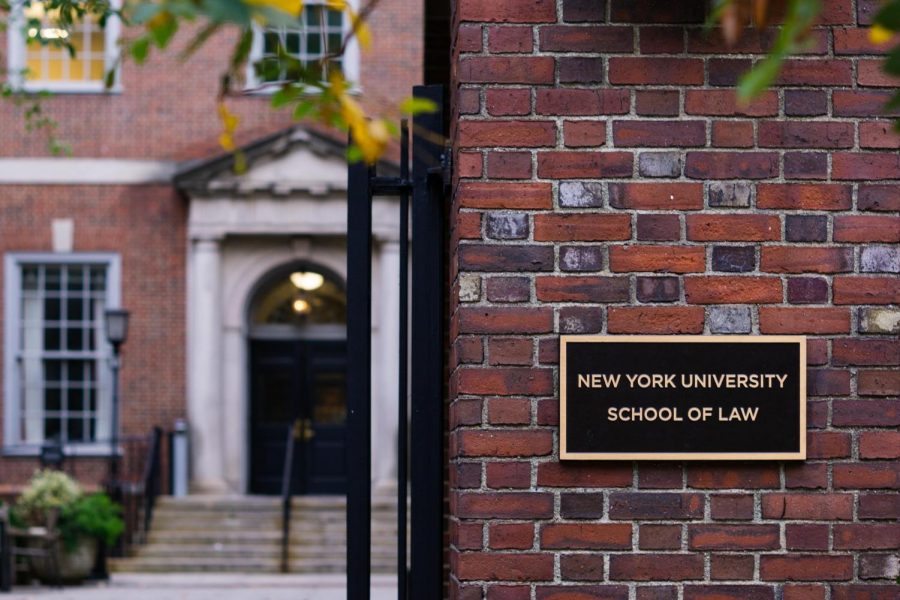Amid worsening border crisis, NYU panel talks mistreatment of Haitian migrants
A panel organized by NYU’s Center for Latin American Caribbean Studies discussed President Biden’s immigration policy failures and the history of American racism against Haitians.
NYU’s Center for Latin American and Caribbean Studies held a panel to discuss the worsening Haitian immigration crisis. The panel highlighted President Biden’s failure to implement solutions and America’s history of racism against Haitians. (Photo by Kevin Wu)
December 1, 2021
NYU’s Center for Latin American and Caribbean Studies discussed an ongoing surge of Haitian migration at the U.S. southern border at a Nov. 22 event. The teach-in session, called Haitian Migration Beyond The News Cycle, focused on the United States’ historically racist treatment of Haitian immigrants, current U.S. policies towards Haiti, and the root of the current crisis.
The panelists included Gabrielle Apollon, co-director of the Haiti Justice and International Accountability Project at NYU Law’s Global Justice Clinic, along with Haitian development specialist Emmanuela Douyon, journalist Ralph Thomassaint Joseph, and Haitian Creole Language Institute founder Wynnie Lamour.
Douyon said that American immigration policy has not kept up with the changing Haitian political landscape.
“It’s like they are treating Haiti as the country they knew from years ago,” Douyon said. “Haiti is changing. It’s evolving, and the U.S. needs to understand that and show more ambition and see Haiti as a partner — not only as a place where refugees are coming from that they need to deal with.”
The Biden administration has been struggling to cope with the influx of migrants since mid-September, when up to 15,000 migrants made their way to the southern border. This increase has shed light on the flaws in the administration’s border policies, such as when border patrol agents were seen chasing Haitian migrants on horseback in Del Rio, Texas.
The images of the incident drew criticism of the treatment of Black migrants at the border, with organizations like Black Lives Matter and the NAACP calling the Biden administration’s treatment of Haitian migrants inhumane. The organizations also condemned the continuation of Title 42, a Trump-era immigration policy that used the pandemic to justify the immediate expulsion of people and goods from the United States, including asylum seekers. Biden previously claimed during his presidential campaign that he would undo these harmful changes to the immigration system.
Under Title 42, 36% of Haitian migrants were turned away from the border in September, and Secretary of Homeland Security Alejandro Mayorkas has stated that under the policy, he expects that the mass expulsion of migrants will continue. In addition, the Biden administration has announced plans to reinstate the “Remain in Mexico” policy used during the Trump administration, which requires asylum seekers to stay on the Mexican side of the border while waiting for immigration court hearings. The program was criticized for leaving migrant families in drug cartel-controlled towns on the U.S.-Mexico border.
The Global Justice Clinic, along with its counterparts at Harvard Law and Yale Law, asked on Feb. 13 that the United States denounce the unconstitutional actions of Haiti’s then-president Jovenel Moïse, which the organizations say contributed to the mass migration.
Joseph said that the United States has not let Haiti grow and has not held itself accountable for human rights violations against the Haitian people, all to sustain the outdated notion that a majority-Black country cannot be a prosperous country.
“I think that we cannot understand U.S. policy in Haiti without the prism of racism,” Joseph said. “When Haiti became independent in 1804, Haiti was outcast because it symbolized the negation of the world order … Haiti had to be poor and unstable because a well-functioning country governed by Black people prospering financially and intellectually could represent a terrible counternarrative to the white Western civilization.”
Apollon also criticized the Biden administration’s September decision to deport migrants despite declaring temporary protection for Haitians from deportation in the spring.
“This decision to mass-deport people in these extraordinarily severe conditions doesn’t make sense,” Apollon said. “Unfortunately, it seems like it was one step forward and three steps back, and so that deeply troubles me and many advocates.”
As the situation in Haiti escalates, many are calling on the U.S. government to change its policies at the border and once again grant protective status to Haitian migrants. In October, there was a Free Haiti Rally and March in New York where protesters, including the Haitian American Students Association at NYU, demanded an end to deportation flights and called for the Biden administration to ensure the safety of asylum seekers.
On social media, the Haitian American Students Association urged students to contact their senators and representatives and donate to organizations like Houston Haitians United and the Haitian Bridge Alliance, which are working to provide relief and assistance to migrants at the southern border.
Contact Carmo Moniz at [email protected].




























































































































































